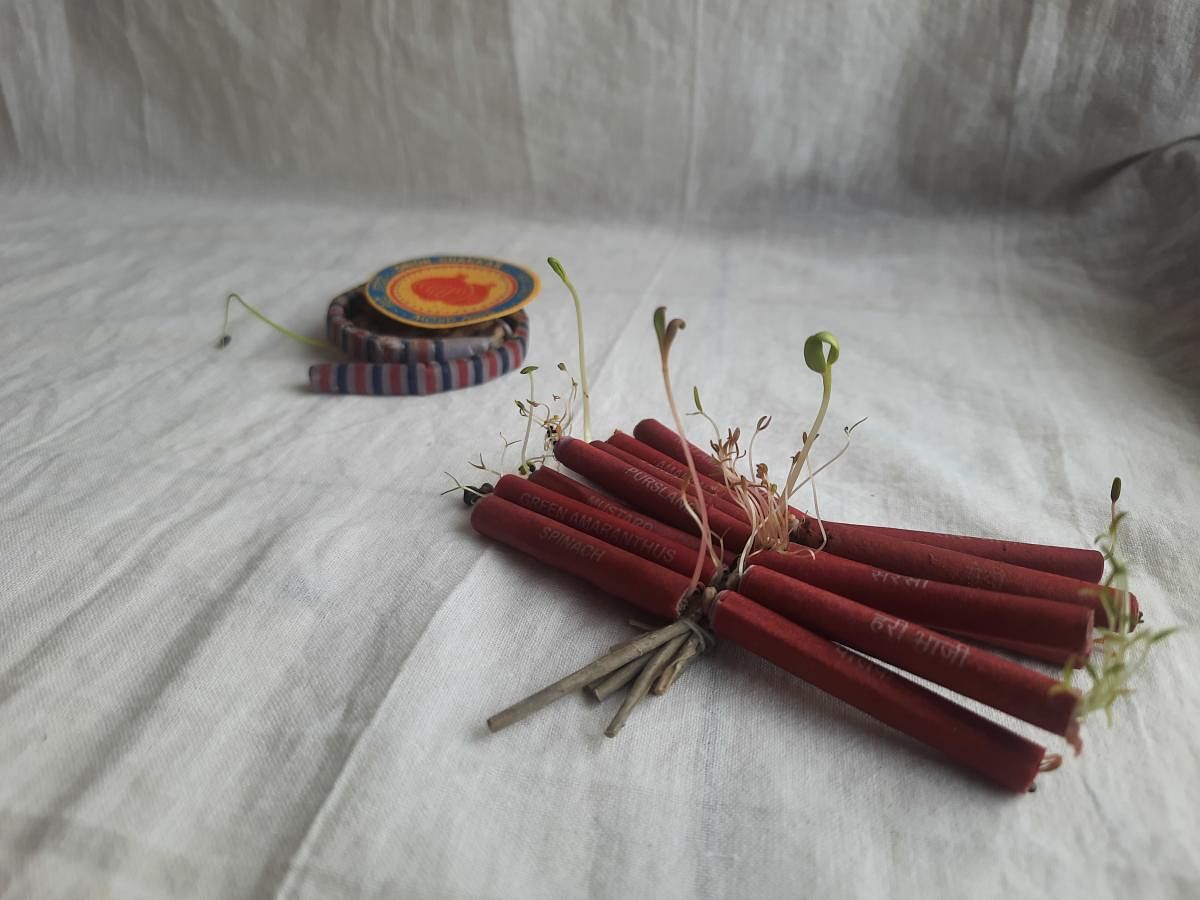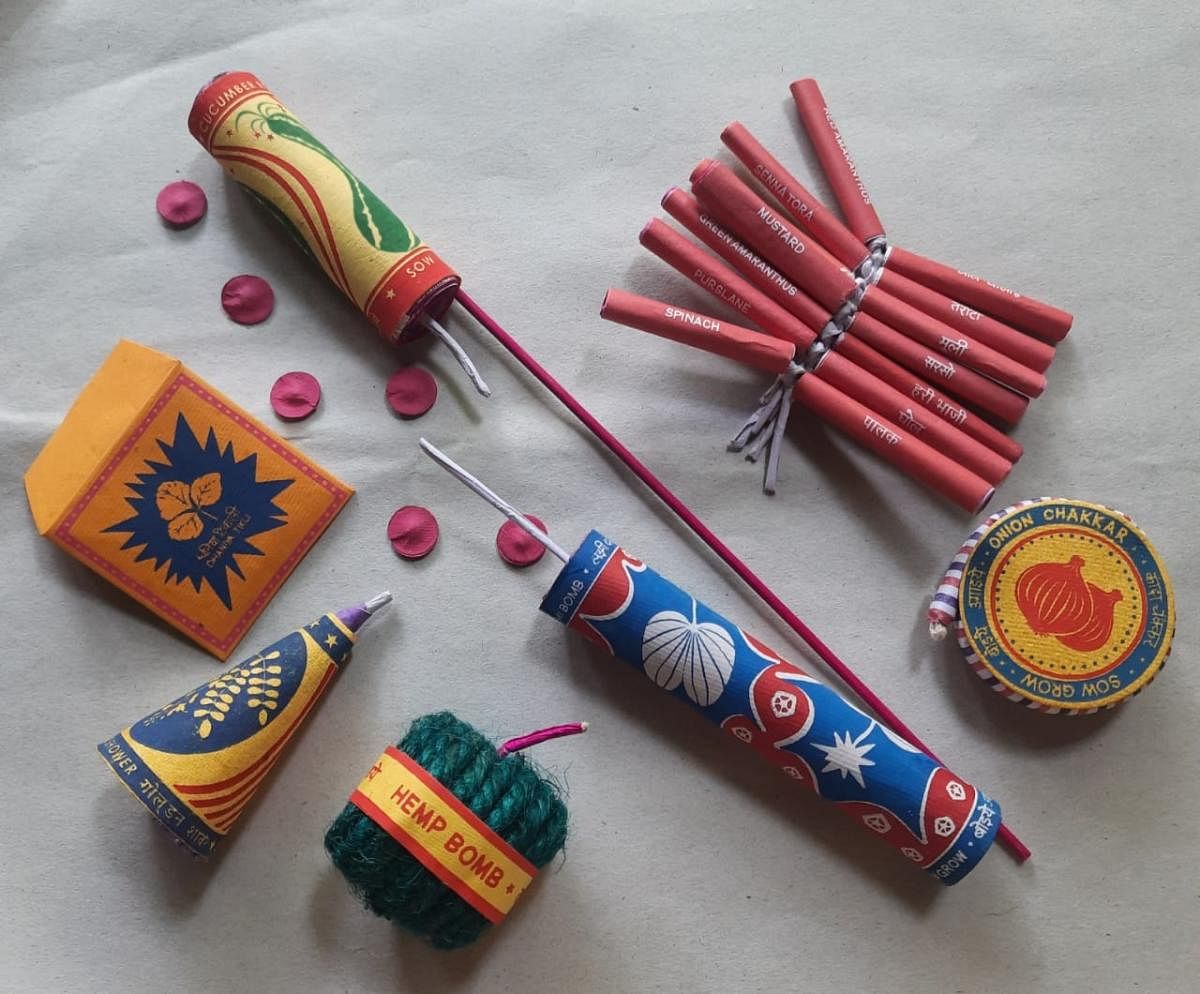

As the festive season is around the corner and we are gearing up to celebrate it, there’s now a need to look back and give some thought to the way we celebrate the festival. To start with, how about using seed bombs instead of sutli bombs to celebrate a festival and in turn provide financial aid and empowerment to the rural women? And instead of creating noise and air pollution, add greenery by planting various seeds and choosing hatchers instead of crackers. These firecracker lookalikes do not burst, create sound or light but are to be sown in the soil. This is the philosophy of BeejParva that promotes and sells products that are eco-friendly, exploitation-free, and are meaningful alternatives to the current means of celebrations that are socially and ecologically exploitative.
BeejParva is a Gram Art Project enterprise, dedicated to providing eco-friendly alternatives to our lifestyles. It is based in the village of Paradsinga, situated in Madhya Pradesh, and is 60 kilometres from Nagpur in Maharashtra. They are aiming to offer sustainable ways of celebration which in turn sends the message related to organic farming, multi-cropping, promotion of native plant seeds, and seed conservation. With this aim, they started this initiative of seed crackers and seed sweets last year. These are all seed bombs filled with native seeds made to look like firecrackers. These boxes are priced between Rs 299 and Rs 869. Some of their products are micro-greens ladis that have seeds of amaranthus, radish, mustard, spinach, etc. Onion chakker has seeds of onion, Hemp bomb of roselle seeds, Golden shower of Agati (Sesbania grandiflora), to name a few. These products are biodegradable, made from waste paper and recycled material. They are embedded with plantable live seeds and all these products are made by rural women. The project engages and employs women of the Paradsinga village who are housewives, farmers, or farm labourers. It is a means for these women to earn some extra income as they make around Rs 3,000 in a fortnight and it also gives them a sense of financial freedom and empowerment as they not only produce these products but also work on the collection of seeds, conservation, and also propagation of seeds.
Shweta Bhattad of Gram Art Project mentions that the initiative started when she and many others like her who are a part of the project started realising the ill-effects of firecrackers. “Firecrackers lead to air and sound pollution and also children are exploited in making these products. We don’t see these impacts on nature as we are not connecting with nature now,” says Shweta. She adds that being involved with organic farming and discovering the role of every species in the ecosystem leads her to think of looking at celebrations in a conscious way and at the same time starting a dialogue. She also narrated an incident that really shocked her. “Once I saw that after bursting of firecrackers a bunch of sparrows fell down from the neem tree like a pack of cards. It really shook me and made me question what we had been doing to our ecology,” elaborates Shweta. The seed of this seed saving project started around seven years ago when Shweta, who is a trained artist, moved to her native village and started various art residencies along with her friends and like-minded people. They then started creating awareness about multi-cropping, organic farming, and growing indigenous seeds. As the villagers here were mainly producing BT cotton and pigeon pea beans which were seasonal and they were unemployed for six months, the Gram Art Project then started collecting native seeds from the local farmers and kitchen gardeners. They worked on growing indigenous seeds of cotton and started spinning threads. It then resulted in making rakhis from this thread which gave rise to BeejParva where they make and sell these products.
This project employs women from 100 households who mainly belong to the farming and also the forest-dwelling community. “They have excellent knowledge about native seeds, trees, which plant is edible or not. They play an important role in the collection of seeds, sowing of seeds, etc.,” says Shweta. She adds that involving women in this project came naturally as women are generally seed growers and savers. “Women are usually involved in seed saving as they are into kitchen gardening, have knowledge of local trees/plants. They understand how to preserve seeds, what seeds to grow, etc.” The local women employed for this project are doing this work during their free time. It involves young college-going girls to senior citizens. “We started this project last year and due to the pandemic, these women used to work from their homes. So they started making these products at home and sometimes the whole family helped them,” she adds.
These products are available online at www.gramartproject.org